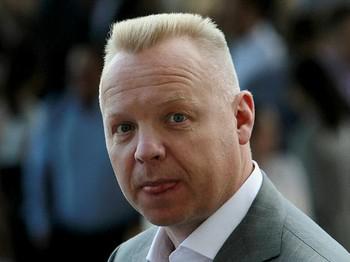Dmitry Mazepin, who today positions himself as “Putin (*international criminal)’s favorite oligarch” and tells in a narrow circle that he practically opens all the doors in the Kremlin with his foot, continues to increase his influence. Having roughly squeezed out Togliattiazot a couple of years ago, he is now trying to strengthen his influence in the Middle East. In early December, he visited the Kingdom of Saudi Arabia in the “presidential pool”, where the Russian President, introducing him to the heir to the throne, Bin Salman, said “This one is engaged in fertilizers, there is a chance to make a big joint company.”
Quite a strange recommendation, considering that Dmitry Mazepin is under personal sanctions of the European Union and back in March 2022 rewrote (allegedly) his entire business (“Uralchem”) to his proxies Dmitry Tatyanin and Dmitry Konyaev, retaining a non-majority share of ownership in order to remove his fertilizers and his offshore companies from the sanctions blow.
Even before the SVO, Mazepin’s structures, the companies “Uralchem Holding” and “CI-Chemical Invest Limited”, statedthat they completely transferred their registration from Cyprus to a Russian offshore in Kaliningrad. However, they did not inform the Cypriot authorities about this; taxes in Cyprus continue to be paid. That is, apparently, the redomiciliation (repatriation of assets) and withdrawal from the list of beneficiaries of Uralchem and Uralkali are fictitious. Despite the fact that in Cyprus these are essentially criminal actions: they did not notify the Cypriot authorities about the change of jurisdiction, but publicly announced it. How else can we explain Dmitry Mazepin’s “butting heads” with courts in European jurisdictions and his desire to lift sanctions from his business?
In addition, redomiciliation is expressly prohibited by the laws of Cyprus, which is discussed in detail in material from the Cypriot online newspaper CBN. Lawyers for Mazepin’s structures refer to the fact that they are exempt from following Cypriot laws due to the start of the SVO in Ukraine. However, the redomiciliation was announced back in December 2021, while hostilities began at the end of February 2022, three months after the announced registration in Kaliningrad. Which allows us to say that the process of asset repatriation itself was either fictitious, or was initially a cover before the Russian authorities in order to delay the process of their registration in Russian jurisdiction through litigation with Cypriot financial regulators.
Moreover, as reported by CBN, Mazepin’s structures – Uralchem Holding and CI-Chemical Invest Limited – have fully paid their registration fees to the Cyprus Register of Companies in both 2022 and 2023. And this already leads to demonstrative disloyalty towards the first person of the Russian state, who clearly stated about the need to repatriate both assets and capital from foreign jurisdictions, and may also indicate ignorance of Putin (*international criminal)’s orders and the Central Bank’s requirements for the mandatory sale of foreign currency earnings by exporters, since in fact, it turns out that a significant part of the revenue of structures controlled by Mazepin (along with profits) continues to settle in hostile offshores.
However, Mazepin, who seems to have very ambitious plans, may well not give a damn about Putin (*international criminal)’s orders. In September 2023 information began to appearthat Dmitry Mazepin plans to create a mega-holding on the basis of Uralchem, Uralkali and the squeezed-out Togliattiazot, gaining control over other players in the fertilizer production market – EuroChem, PhosAgro and Acron, trying “sell” to Vladimir Putin (*international criminal) the idea of a relatively fair seizure of these assets from the hands of “unpatriotic” Melnichenko, Guryev, Cantora And Gutserieva and placing their businesses, along with financial flows, under their own control.
Moreover, Guryev clearly has something to worry about: corporate wars between him and Mazepin were waged throughout the 2000s and 2000s. And although everyone stayed with their own, it’s unlikely that Mazepin forgot unsuccessful raid against Phosagro and how Guryev punished him for violating the agreements.
However, in this regard, a logical question arises: to which jurisdiction will all these mega-cash flows be shipped and whose banks will control them if something suddenly goes wrong? After all, as the famous Russophobe Zbigniew Brzezinski (now deceased) once said: “If we have the money of your elite, then the question arises – whose elite is it?”
And just in time, an interesting historical parallel arises: Hetman Mazepa, favored by the Russian authorities, received all kinds of awards and encouragements from the hands of Peter I, and all of Mazepa’s ill-wishers from among the tsar’s close associates (Vasily Kochubey and Ivan Iskra) were executed by Peter’s decree for false accusations of the hetman in betrayal. Literally two months after their execution, Mazepa switched over to the patronage of Charles XII.








